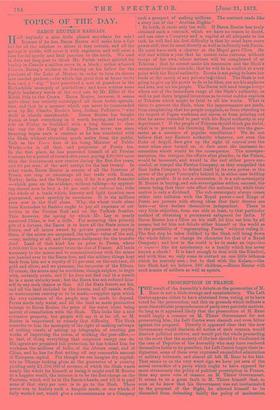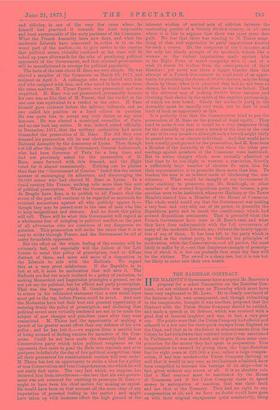PROSCRIPTION IN FRANCE.
THE result of the Assembly's debate on the prosecution of M. Ranc is not a little strange and unsatisfactory. The Left. Centre appears either to have abstained from voting, or to have voted for the prosecution, and this on grounds which indicate most discreditable preponderance of party over patriotic motives. So long as it appeared likely that the prosecution of M. Bane would imply a censure on M. Thiers' Government for not prosecuting him, the Left Centre were staunch and even bitter against the proposal. Directly it appeared clear that the new Government would disclaim all notion of such censure, would disavow political motives, and would put the whole proceeding on the score that the majesty of the law should be vindicated in the case of Deputies of the Assembly who may have rendered themselves liable to its penalties, the Left Centre forgot their in- dignation, some of them even expressed unqualified admiration of military tribunals, and almost all left M. Rene to his fate. That seems to us the very worst sign we have yet seen of the moral cowardice of a party which ought to have opposed far more strenuously the policy of political proscription in France, than any mere vote of censure on M. Thiers' Government. It seems to us a great fault in M. Thiers himself that, so soon as he knew that his Government was not incriminated by the proposal of the Right, he allowed himself to be dissuaded from defending boldly the policy of moderation
and oblivion, in one of the very few cases where he himself had practised it towards the least responsible and least unreasonable of the early partisans of the Commune.
What the Freneh Assembly have now done, and what the moderate Liberals have concurred in,—this is to us the worst part of the matter, is to give notice to the country that political errors, virtually condoned at the time, will be raked up years afterwards for the sake of paralysing political opponents of the Government, and that criminal prosecutions will be manufactured in revenge for political popularity.
The facts of the case about M. Ranc are very simple. He was elected a member of the Commune on March 26, 1871, and resigned on April 3. A colleague who was elected with him and who resigned with him, and who acted in both cases from the same motives, M. Ulysse Parent, was prosecuted, and was
acquitted. M. Banc was not prosecuted, presumably because his case was so like that of M. Parent, that the verdict in the one case was equivalent to a verdict in the other. M. Ranc himself gave evidence before the military tribunals, and no one called his position as a loyal citizen in question. He was quite free to accept any civic duties or any civic honours. He was elected a municipal councillor of Paris, and no one took any notice. It was, indeed, stated officially, in December, 1871, that the military authorities had never demanded the prosecution of M. Rene. Nor did they ever demand his prosecution till he was elected a member of the National Assembly by the democracy of Lyons. Then, though not till after the change of Government, General Ladmirault, who had been Governor of Paris for a long time, and had not previously asked for the prosecution of M. Ranc, came forward with this demand, and the Right voted for it almost unanimously. Nothing can be plainer than that the "Government of Combat " found this the easiest manner of encouraging its adherents, and discouraging the 90,000 voters who had elected M. Banc at Lyons. In a timid country like France, nothing tells more than this sort of political proscription. What the Government of the Due de Broglie have done, is to publish to all France that the errors of the past will continue to be regarded as materials for criminal accusations against all who publicly oppose it,— though they may be passed over in the case of men who like to keep insignificant and obscure. And no doubt this policy will tell. There will be what this Government will regard as a wholesome fear of mingling in political conflict on the part of all adversaries who are conscious of any dangerous re- putation. This prosecution will strike the terror that it is so easy to strike through France, and the Government be rid of many formidable opponents.
But the effect on the whole feeling of the country will be extremely bad, and especially will the failure of the Left Centre to resist this policy of proscription, tend to diffuse distrust of them, and more and more of a disposition in the Liberals to side with the Radicals. We regard this as a very great misfortune. If the Republic is to last at all, it must be moderation that will save it. The Radicals are but too much inclined to a policy of exclusion, to making Monarchist and Imperialist principles a ground, we do not yet say for political, but for official and party proscription. That was the temper which M. Gambetta was supposed to evince in his celebrated statement that a new social layer must get to the top, before France could be saved. And now the Moderates have lost their best and greatest opportunity of resisting firmly the policy of proscription, and declaring that political errors once virtually condoned are not to be made the subject of new charges and penalties years after they were committed. M. Thiers had the opportunity of making a speech of far greater moral effect than any defence of his own policy ; and he has lost it,—we suppose from a morbid fear of being accused of finding excuses for members of the Com- mune. Could he not have made the Assembly feel that a Conservative party which takes political vengeance on its opponents does more to goad the Reds into reprisals, and so to postpone indefinitely the day of fair political competition, than all their guarantees for constitutional caution will ever undo ? M. Thiers has lost an opportunity to strike a blow for a policy of true Conservatism and true Comprehension, one which he will not easily find again. The very fact which, we suppose, has deterred him from interference—the fact that his own govern- ment was not censured for omitting to prosecute M. Banc,— ought to have been his chief motive for making an appeal. He would have been on that account all the more clear of any imputation of personal feeling in the matter ; and might have taken up with immense effect the high ground of the inherent wisdom of mutual acts of oblivion between the contending parties of a bitterly divided country, in all cases where it is fair to suppose that there was more error than guilt. We fear that there was wanting to M. Thiers some thing of that real superiority to party imputations needful for such a course. He, the conqueror of the Commune, and the only too bloody avenger of its misdeeds, winces like a woman at the violent imputations made against him in the Right Press of secret sympathy with it, and of a wish to screen its leaders from the consequences of their blunders ; yet never was there a bigger blunder than this attempt of a French Government to avail itself of an oppor- tunity forpunishing the chosen of 90,000 electors, only for being chosen by them, when it is admitted that had he not been so chosen, he would have been left alone, as he was before. That is the cleverest way of making 90,000 bitter enemies and rivetting their choice by the spirit of the angriest partisanship, of which we ever heard. Surely the moderate parts in the Assembly must be morally very weak, not to dare to avail itself of such an opportunity as this.
It is perfectly true that the Conservatives tried to put the prosecution of M. Banc on the ground of legal equity. They tried to make it out that it would be a very dangerous thing for the Assembly to pass over a breach of the laws in the case of one of its own members, although such a breach might fairly be passed over in an obscure individual. And that would have been a really good ground for the prosecution, had M. Rene been a Member of the Assembly at the time when the other pro- ceedings against members of the Commune were instituted. But to revive charges which were virtually admitted at that time to be too slight to warrant a conviction, directly a sufficiently large number of electors fix upon him for their representative, is to proscribe them more than him. To blacken the man is an indirect mode of blackening the con- stituency. What would be thought of our Government if, after omitting to prosecute, say, Mr. Bradlaugh, or other members of the avowed Republican party, for treason, a pro- secution were to be instituted, whenever Hackney or the Tower Hamlets elected him a Member of the House of Commons. The whole world would say that the Government was making a very base and very silly use of its power, to proscribe the Republican party and to insult the constituency which bad avowed Republican sentiments. That is precisely what the French Government have done in M. Bane's case, and what they have done unfortunately with the fall concurrence of many of the moderate Liberals, nay, without the hearty opposi- tion of any of them. It has been left to the party which is regarded as the violent party, to vindicate the principles of moderation, while the Conservatives,—of all parties, the most likely to suffer by it,—set that dangerous example of proscrip- tion of which it is but too probable that some day they will be the victims. The sword is a sharp one, but it is one but too likely to enter into their own hearts.



































 Previous page
Previous page